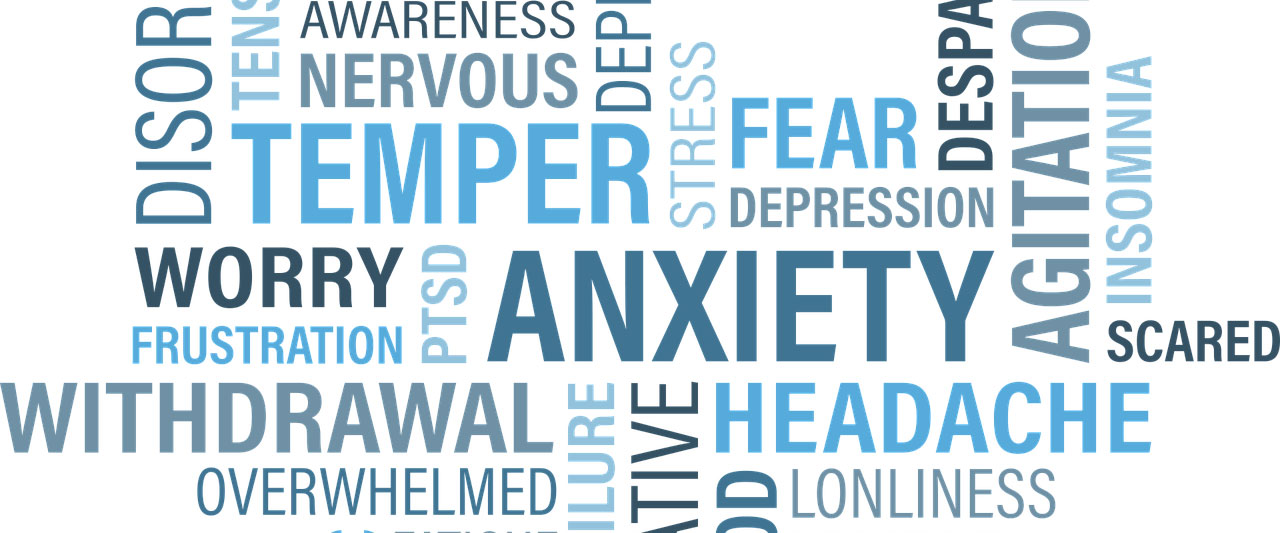1. What is anxiety?
Anxiety is when your emotions of nervousness, worry, uneasiness take over in your mind and you have difficulty with focus and concentration in your everyday activities. You may even feel fear or dread while you are anxious. It’s normal to feel anxiety when giving a speech or presentation, when your teen takes the car for the first time by themselves, or when you are in an unfamiliar situation and not sure of what to do. Anxiety becomes a problem when the feelings are intense, excessive and interfere with your daily living and you have trouble controlling it.
2. What are different kinds of anxiety disorder?
There are 5 major types of anxiety disorders. Most anxieties fall into one of these categories. Generalized Anxiety Disorder or GAD. is when people worry about ordinary, everyday worries about finances, health, their children or parents, to an excessive amount where it can cause distress or impairment in your normal everyday functions.
Obsessive-compulsion disorder, OCD, is when your thoughts are difficult to control, or you repeat an action over and over. A common OCD is excessive worry about germs to the point you worry about everything you touch may have germs on it and you repeatedly wash your hands or use hand sanitizer after you touch anything. These thoughts and actions bring no pleasure except to stop the thoughts and actions for a while until it starts again.
Panic Disorder is defined as recurring unexpected panic attacks. A panic attack often happens without warning and can be debilitating. You suddenly feel short of breath, sweating, shaking, nausea, stomach pains, you may be dizzy, some people develop chest pain, some people feel a sense of impending doom. Panic attacks are usually less than 20 minutes sometimes only a couple of minutes. You may feel terrified and overwhelmed and not understand why.
Post Traumatic Stress Disorder, PTSD, is an anxiety disorder that is related to a trauma in one’s past. It may be a soldier who has been in battle and seen some pretty traumatic stuff. It may be someone who was abused, or even attacked on the street. Symptoms typically start within a couple of months of the event, although some people don’t experience any difficulty several months or even years later. PTSD symptoms include flashbacks of the event, bad dreams and trouble sleeping, frightening or anxious thoughts, irritability or anger for no apparent reason. There may be a trigger to the symptoms. People often don’t associate what’s happening to them to their past trauma’s.
Social Anxiety Disorder, or social phobias, is a feeling of being ashamed or embarrassed, or even humiliated, criticized in front of others in a public setting. They can be afraid of being judged or even fear of offending someone. Often this person has had a very stressful life experience in their past that may have been the cause, such as bullying or teasing in grade school, physical, sexual or emotional abuse. Social phobias often begin in the teenage years.
Separation Anxiety Disorder is a lesser know anxiety disorder that is typically small children who become anxious when separated from their main caregiver. It can also happen to adults who can become extremely anxious about something bad happening to a loved one.
3. What is the worst kind of anxiety to have?
All anxieties can be bad, or not so bad depending on the person experiencing the anxiety. We all come into this world to learn and experience different things. Sometimes bad things happen to good people. How we each react to what happens to us is partly dependant on how we have learned to cope with what life gives us. People learn different coping skills from the important people in their lives - parent, caregivers, teachers, friends and people in authority. How bad or not bad symptoms of anxiety may be is very subjective and only the person experiencing the symptoms can know how bad it is for them.
4. Will anxiety go away?
Yes, and No. Anxiety itself is a fact of life. Like stress is. A stressful life event can give you anxiety, like getting married, starting a new job, losing a job, or moving to a new city. All people tend to experience anxiety once in a while in their lives. When the event is over the anxiety and stress is over. An Anxiety Disorder, however, is a different entity. Yes, it can go away, but usually people learn to manage it, decrease the severity of symptoms so it doesn’t disrupt their lives. There are many tools out there to use to manage your anxiety. Rapid Transformational Therapy is a fantastic one in that it helps you to find why you have an anxiety disorder, when it started and what you can do to help yourself.
5. What is anxiety where you think you are sick?
Illness anxiety disorder is a real thing, also call hypochondriasis, or health anxiety. It is excessive worry that you are sick or may become sick. You may have symptoms mild or severe that may be normal body sensations that with your anxiety become magnified. You go to your doctor who sends you for tests and scans and everything comes back negative. You may experience gastrointestinal discomfort that may become severe and find out that the stress of thinking you are ill is what is causing your symptoms. You may have experienced a serious illness in the past or a loved one may have had serious illness and any symptoms that may seem like that past illness may make you anxious and stressed. Risk factors for illness anxiety are: any major life stress, or threat of serious illness, history of past illness, relationship or family problems can cause excessive worry, or having other mental health problems. If you experience increasing anxiety find a coach or therapist who can help you.
6. What is anxiety where you can’t leave the house?
Agoraphobia is a type of anxiety disorder which is a fear of being in situations or places where escape may be difficult and help may not be readily available. Agoraphobic people are sometimes afraid to leave any environment they consider safe, like their home. They may have panic attacks, and feel trapped, in physical danger, feel helpless or even embarrassed. So, they tend to avoid places which may trigger any kind of intense anxiety lest they have a panic attack. Risk factors for agoraphobia include: having a panic disorder or other phobias, responding to heightened anxiety with fear and avoidance, experiencing major stress in your life, PTSD, abuse, having an anxious or nervous disposition. If you find your anxiety is increasing and getting in the way of living your life get help now.
7. What can I do when anxiety gets to be too much?
There is a long list of self help techniques that are excellent to calm a troubled mind when your anxiety starts getting in the way of living your life. Learning self care before your anxiety gets to the point you need your health care professional giving you a prescription is always the best option.
• Number one on the list: accept your anxiety! When we let the occasional anxiety run its course without fighting it, it make the anxiety less than it was. Tell yourself “OK I’m feeling anxious about this. What is it that is making me nervous? Where in my body am I feeling the anxiety? It’s OK for me to feel this way. This is a normal response to a stressful situation.”
• Start deep breathing. If you can, sit down and relax to the best of your ability. Deep breathing, slow, and from the belly, in through the nose and out through the nose. This tells your body you are not in any danger. It stops the stress response in it’s tracks. Your body can’t stay in stress mode when you are relaxed and breathing deeply. 2 minutes, 5 minutes, if you have 10 minutes then try the next one on this list.
• Meditate. Once or twice a day for 10 or 15 minutes can teach your mind and your body how to be calm. Regular practice actually rewires your mind for calm.
• Eat healthy. Cutting sugar and processed foods from your diet really will make a difference in your mood. A lot of chemicals that a re added to packaged foods will alter the hormones and enzymes that keep your body and mind running smoothly.
Take a look at my website for more information on stress and anxiety.
8. What is an anxiety pen?
An anxiety pen is vaping with CBD. Vaping is not considered a healthy habit. The heat in your mouth, your wind pipe and into your lungs can cause inflammation and a host of other problems. That being said, it is no tobacco and has no nicotine in it. CBD, a cannabinoid that does have health benefits, is non-addictive as long as it is only CBD, with no THC in it. THC is the part of the cannabis that makes you high and you are considered impaired when you take THC. I don’t recommend vaping with anything. Some people do find relief of their anxiousness and it calms them down.
Do you have too much anxiety in your life? There are many ways to help yourself. See my website for tips. Call me for a personalized plan of care tailored just for you.




